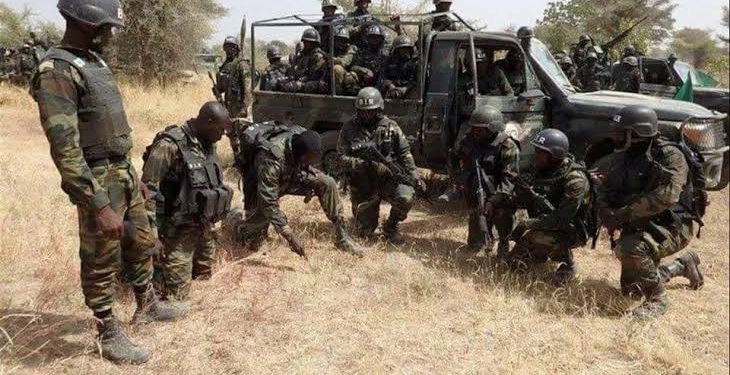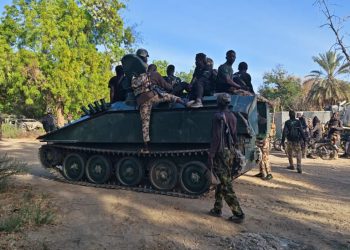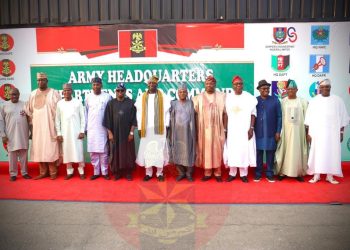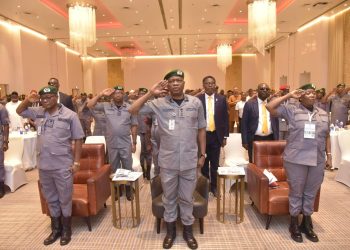By Nkechi Eze
For more than a decade, Nigeria’s security architecture has been heavily tested by persistent threats ranging from terrorism and insurgency in the Northeast, to banditry and kidnapping in the Northwest, separatist violence in the Southeast, as well as oil theft and maritime crimes in the Niger Delta. These overlapping security challenges have compelled the Nigerian Armed Forces to adopt a broad, multi-theatre approach to internal security, employing both kinetic and non-kinetic strategies across all geopolitical zones. Against this backdrop, the Defence Headquarters has revealed a sweeping two-year record of military operations, announcing that no fewer than 6,260 terrorists, violent extremists and other criminals were neutralised by troops between June 2023 and June 2025. The update, which provides a rare consolidated insight into Nigeria’s ongoing internal security efforts, was presented by the Deputy Director of Defence Media Operations, Brigadier General Mohammed Abu-Mawashi, during an expanded engagement with media executives held on Thursday at the Defence Headquarters in Abuja.
In what he described as a testament to the commitment and resilience of the Nigerian Armed Forces, Brigadier General Abu-Mawashi said that a total of 14,138 suspected terrorists, bandits, kidnappers, economic saboteurs and other violent actors were arrested in the course of operations within the period under review.
He added that 5,365 civilians, many of them kidnap victims or persons displaced and trapped in conflict-ridden communities, were rescued by troops and reunited with their families. According to him, these achievements span multiple coordinated operations led by the Nigerian Army, Navy, and Air Force, alongside other security agencies, and cut across every region of the country. The operations, he said, were designed to not only dismantle criminal networks and terrorist cells, but also to restore freedom of movement and civilian confidence in areas previously under siege.
The report revealed that troops recovered large caches of arms, ammunition, and combat equipment in various theatres of operation, thereby weakening the firepower and supply chain of terrorist and criminal groups.
In the Niger Delta region, which remains a strategic economic zone due to its oil resources, the military recorded major victories in the fight against crude oil theft and pipeline vandalism. Brigadier General Abu-Mawashi said stolen crude oil and petroleum products valued at over N83 billion were recovered during sustained raids and patrols.
He also noted that 103 criminals were killed, 2,760 suspects were arrested, and 266 kidnapped civilians were rescued within the region. Operations included the destruction of illegal refining sites and the interception of illegally bunkered products, actions he said have significantly disrupted the activities of oil thieves and economic saboteurs operating in the creeks and swamps.
In the Northeast, where Nigeria has waged its longest-running war against insurgency, the Armed Forces continued to take the battle to the strongholds of Boko Haram and Islamic State West Africa Province (ISWAP). The military neutralised 1,246 insurgents in several offensives, arrested 2,467 others, and rescued 1,920 civilians held captive in insurgent enclaves or liberated from areas previously inaccessible due to heavy terrorist presence. Troops also recovered 982 arms and 2,153 rounds of ammunition in the region, including sophisticated weapons used for ambushes, IED attacks, and coordinated raids. The report emphasized that while major gains have been made in the region, clearance operations, intelligence gathering, and air raids would continue until total normalcy is restored.
Equally intense operations were carried out in the Northwest, which has in recent years witnessed a surge in banditry, mass abductions, and destruction of rural communities. According to the Defence Headquarters, 1,374 bandits were killed in engagements with troops, including several of their notorious commanders. In addition, 2,160 suspects were arrested and 3,288 civilians were rescued from various bandit camps, forests, and hideouts across Zamfara, Katsina, Kaduna, Kebbi and Sokoto States. Recovered from the bandits were 947 weapons and a staggering 25,802 rounds of ammunition, reinforcing the scale of the security threat in the region and the heavy firepower often encountered by troops in the field. Brigadier General Abu-Mawashi stressed that these operations have continued to disrupt the operational capacity of the armed groups and restored some level of security to previously volatile communities.
In the North Central region, 730 terrorists, bandits and violent criminals were neutralised in the course of special operations. Troops also arrested 7,153 suspects, rescued 1,510 civilians and recovered 1,065 weapons and 19,709 rounds of ammunition. The region, often plagued by farmer-herder clashes and militia activities, has seen increased military presence and surveillance in recent months to deter reprisal attacks and improve civil security.
The situation in the Southeast, which has experienced waves of politically motivated violence and attacks on government installations, was addressed through the deployment of Joint Task Force operations. Over the two-year period, 440 suspected terrorists and armed elements were killed in the region, while 1,677 suspects were apprehended. Security forces rescued 294 civilians, many of whom were kidnapped or caught in the crossfire of separatist attacks. Troops also recovered 683 weapons and 21,300 rounds of ammunition in operations targeting illegal camps, armouries, and operational vehicles used by criminal groups.
In the Southwest, military operations focused on tackling kidnapping, cult-related violence, smuggling, and sabotage of critical national infrastructure. During this time, 80 criminals were killed in exchanges with troops, 1,763 were arrested, and 89 kidnap victims were rescued. In addition, the military recovered 143 weapons and an astonishing 177,904 rounds of ammunition, one of the largest regional ammunition seizures during the reporting period.
Speaking further, the Director of Defence Information, Brigadier General Tukur Gusau, noted that the media engagement marks a major step in ensuring greater transparency and public accountability from the Armed Forces. He stated that the programme is aligned with one of the central philosophies of the Chief of Defence Staff, General Christopher Musa, which emphasizes a people-centric approach to military leadership. Brigadier General Gusau said the interaction with journalists was not just to showcase achievements but to build stronger relationships between the military and the media, with the ultimate goal of keeping Nigerians properly informed about the activities, challenges and sacrifices of the Armed Forces.
He reiterated that the military remains committed to restoring lasting peace and security to every part of Nigeria. According to him, the ongoing operations are not just aimed at containing threats but at eliminating the root causes of insecurity through a combination of combat missions, civil-military cooperation, and community engagement. He appealed to the public to continue supporting the Armed Forces by volunteering credible information and rejecting narratives that undermine national unity or glorify criminal elements. In conclusion, the Defence Headquarters reaffirmed that while the journey to full national security is ongoing, the Armed Forces of Nigeria will remain undeterred, professional, and faithful to their constitutional mandate to defend the territorial integrity of the nation and protect the lives and property of all Nigerians.
















